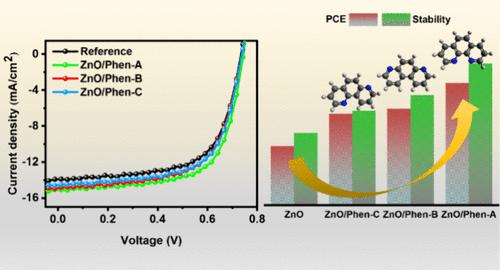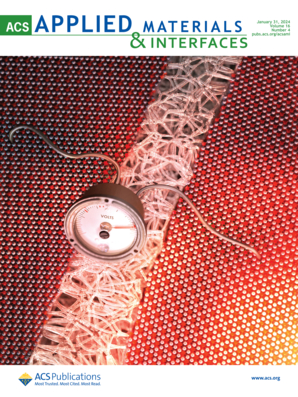通过菲罗啉配位微调有机太阳能电池中氧化锌阴极缓冲层的功函数
IF 8.3
2区 材料科学
Q1 MATERIALS SCIENCE, MULTIDISCIPLINARY
引用次数: 0
摘要
氧化锌(ZnO)被广泛用作反相有机太阳能电池(OSC)的阴极缓冲层(CBL)。通过降低氧化锌 CBL 的功函数(WF)来提高 OSC 的性能是一个突出的研究领域。在此,我们报告了三种菲罗啉配体(1,10-菲罗啉(Phen-A)、4,7-菲罗啉(Phen-B)和 1,7-菲罗啉(Phen-C))在降低氧化锌功函数方面的作用。Phen-A 功能化氧化锌的 WF 最低,这可能是由于氮孤对有效地捐赠给了锌中心,从而有效地提高了系统的费米能。实验证明,在基于 PTB7:PC70BM 的 OSC 中使用功能化氧化锌薄膜作为 CBL,可以显著提高效率和稳定性。X 射线光电子能谱分析表明,由于氧化锌表面的菲罗啉配体功能化,形成了 Zn-N 键并显著减少了缺氧缺陷。密度泛函理论结果证实形成了强 N-Zn 键,Phen-A、Phen-B 和 Phen-C 的吸附能分别为 -2.05、-1.77 和 -1.33eV。ZnO 表面的功能化改善了界面特性,使 Phen-A、Phen-B 和 Phen-C 的功率转换效率分别提高了 13.2%、7.8% 和 6.7%。本文章由计算机程序翻译,如有差异,请以英文原文为准。

Fine Tuning the Work Function of ZnO Cathode Buffer Layers in Organic Solar Cells by Phenanthroline Coordination
Zinc oxide (ZnO) is widely used as a cathode buffer layer (CBL) in inverted organic solar cells (OSCs). Performance enhancement of OSCs by work function (WF) reduction of the ZnO CBL is a prominent area of research. Here, we report the role of three phenanthroline ligands, 1,10-phenanthroline (Phen-A), 4,7-phenanthroline (Phen-B), and 1,7-phenanthroline (Phen-C), in reducing the WF of ZnO. Phen-A functionalized ZnO has the lowest WF, which can be attributed to the effective donation of nitrogen lone pairs to the Zn center thereby effectively raising the Fermi energy of the system. Significant improvements in efficiency and stability have been experimentally demonstrated by using functionalized ZnO thin films as the CBLs in PTB7:PC70BM-based OSCs. The X-ray photoelectron spectroscopy analysis revealed the formation of a Zn–N bond and a significant reduction in oxygen deficiency defects due to the functionalization of the ZnO surface with phenanthroline ligands. The density functional theory results confirmed the formation of strong N–Zn bonding with adsorption energies −2.05, −1.77, and −1.33 eV for Phen-A, Phen-B, and Phen-C, respectively. The improved interfacial properties due to functionalization of the ZnO surface resulted in 13.2, 7.8, and 6.7% enhancement in power conversion efficiency for Phen-A, Phen-B, and Phen-C, respectively.
求助全文
通过发布文献求助,成功后即可免费获取论文全文。
去求助
来源期刊

ACS Applied Materials & Interfaces
工程技术-材料科学:综合
CiteScore
16.00
自引率
6.30%
发文量
4978
审稿时长
1.8 months
期刊介绍:
ACS Applied Materials & Interfaces is a leading interdisciplinary journal that brings together chemists, engineers, physicists, and biologists to explore the development and utilization of newly-discovered materials and interfacial processes for specific applications. Our journal has experienced remarkable growth since its establishment in 2009, both in terms of the number of articles published and the impact of the research showcased. We are proud to foster a truly global community, with the majority of published articles originating from outside the United States, reflecting the rapid growth of applied research worldwide.
 求助内容:
求助内容: 应助结果提醒方式:
应助结果提醒方式:


